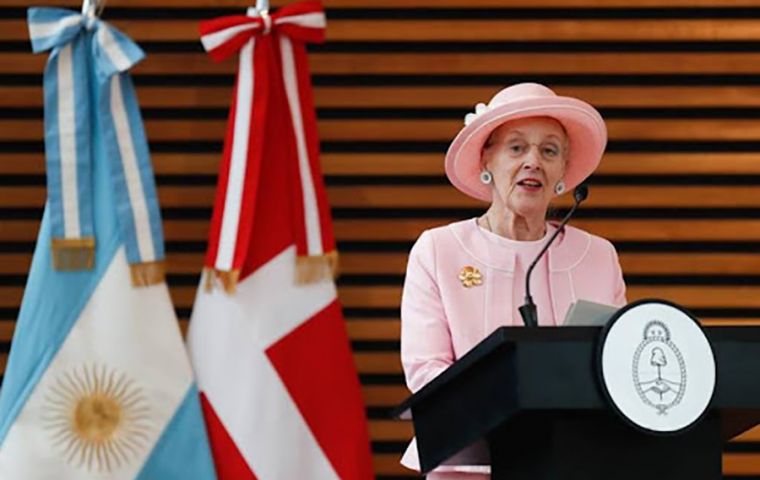MercoPress. South Atlantic News Agency
Denmark to lift Buenos Aires embassy which covers Argentina, Uruguay and Paraguay
 It was not so long ago when Queen Margrethe II of Denmark visited Buenos Aires in 2019 to “establish, strengthen and promote relations” between her country and Argentina
It was not so long ago when Queen Margrethe II of Denmark visited Buenos Aires in 2019 to “establish, strengthen and promote relations” between her country and Argentina The European Kingdom of Denmark Friday announced a reshaping of its foreign policies and a series of measures pertaining thereto which included lifting its embassy in Buenos Aires, which encompasses Argentina, Uruguay and Paraguay. The measure will be effective within a year.
Denmark's Foreign Ministry also explained the other embassy to be downgraded was the one in Tanzania.
According to diplomatic sources, the changes are designed to focus on the country's presence within the European Union as well as on those parts of the world “where democracy, human rights and securities are under increasing pressure,” Foreign Minister Jeppe Kofod pointed out.
“The restructuring means, among other things, that our missions in the EU, NATO, the UN, the Arctic, Africa, as well as about our export initiatives will be further strengthened. In total, 16 missions and 9 departments will be strengthened at the headquarters of the Ministry of Foreign Affairs in Copenhagen,” said the Foreign Ministry in a statement.
Other legations to be shut down were the General Consulate in Chongqing (China) and the trade mission in Barcelona (Spain).
“My priority as Foreign Minister is to ensure the safety and security of the Danish people in a world where democracy, human rights and our values are under increasing pressure. This reorganization is to help us guide the efforts we make, both here at home and around the world so that we can make as much of a difference as possible. The serious event that has occurred in Afghanistan over the past two weeks requires reflection, and we need time to digest and analyze this in cooperation with the Danish Parliament. After that process, the government will present a new foreign and security policy strategy at a later stage,” Kofod added.
”We very much regret the closure of the embassy, there was already a temporary closure between 2002 and 2007 and we hope that this is also so and does not affect a relationship which dates back to 1841, under the government of Don Juan Manuel de Rosas, in charge of Foreign Relations of the Argentine Confederation. The Danish embassy has informed us that it is an administrative decision that has to do with a reordering of its priorities in the world and not with the particular situation in Argentina, the product of an internal analysis that has been going on for many years,” said Argentina's Foreign Ministry in a statement.
Regardless of Denmark's intentions and plans and even of the fact that the diplomatic mission also encompasses two other countries, the lifting of an embassy strikes yet another blow to Argentina.
First, because it is where the embassy is located and second because it is not easy to explain that the mission's departure is in no way connected to the fact that
Argentina has been reported to be the second-worst performing nation globally in terms of foreign direct investment, according to a study from the United Nations Conference for Trade and Development (Unctad).
A First Capital Group study showed that since August 2019 there have been at least 32 operations and/or announcements in which a multinational group has decided to close and/or sell its operations or local business unit in Argentina.
(Read also Departure of foreign companies from Argentina and also from Brazil on the rise and with no end in sight — MercoPress )
Foreign direct investment is considered to be capital that comes from abroad to the country, from firms that are in the country or from new ones, added to the reinvestment of profits made by companies of foreign origin.
Meanwhile, back at home, Denmark has also announced it would scrap all COVID-19 restrictions in two weeks since the Sars-CoV-2 virus no longer poses “a critical threat to society,” in a country where more than 70 % of the population has been fully vaccinated.
“The epidemic is under control, we have record vaccination levels. That is why, on September 10, we can lift the special rules we had to introduce in the fight against Covid-19,” Health Minister Magnus Heunicke said, although he warned that “the epidemic is not over.”
Denmark was one of the first countries to introduce a partial lockdown in March 2020, and in April 2021 it launched a “corona passport” granting holders access to businesses like restaurants, cinemas, gyms and hair salons. That requirement was already lifted in some places such as museums on August 1, and masks have not been mandatory on public transport in Denmark since August 14.
The health pass requirement is also to be discontinued starting September 1 to sit in restaurants and bars, although it will remain in force for nightclubs and other events such as football matches until September 10.




Top Comments
Disclaimer & comment rulesCommenting for this story is now closed.
If you have a Facebook account, become a fan and comment on our Facebook Page!